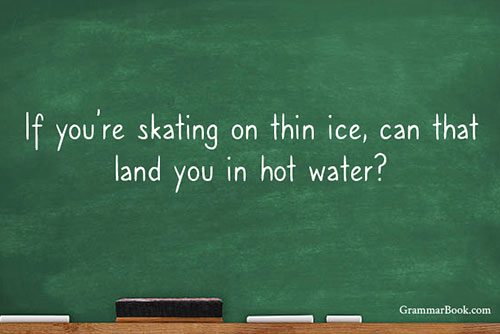|
The English language uses tense to communicate the timing of an action. If we want to write that an action took place in the past, we use the simple past tense: He washed the dishes. She went to the skating rink.
If we wish to identify an action that occurred prior to another completed action, we use the past perfect tense. The past perfect clarifies for readers that one action finished before another one started.
Example
Vic had already done 200 push-ups by the time Renaldo arrived at the gym. |
In this sentence, the simple past tense verb arrived tells us an action took place in the past. Even before that action, however, another one occurred: Vic performed 200 push-ups. The presence of the past perfect tense verb had done informs us of the sequence of the actions.
Forming the Past Perfect Tense
The past perfect tense is formed with the past-tense auxiliary verb had plus the past participle of a verb. This formula remains the same whether the subject is singular or plural.
| Verb |
Subject |
Auxiliary |
Past Participle |
|
| chase |
I |
had |
chased |
I had chased |
| draw |
you |
had |
drawn |
you had drawn |
| limit |
we |
had |
limited |
we had limited |
| walk |
they |
had |
walked |
they had walked |
The subject and the auxiliary of the past perfect also can be contracted:
I had chased > I'd chased
you had drawn > you'd drawn
we had limited > we'd limited
they had walked > they'd walked |
To form the negative of the past perfect tense, we simply insert the word not between the auxiliary and the past participle. This formula remains the same whether the subject is singular or plural.
| Verb |
Subject |
Auxiliary |
Negative |
Past Participle |
|
| chase |
I |
had |
not |
chased |
I had not chased |
| draw |
you |
had |
not |
drawn |
you had not drawn |
| limit |
we |
had |
not |
limited |
we had not limited |
| walk |
they |
had |
not |
walked |
they had not walked |
The auxiliary and the negative word also can be contracted:
I had not chased > I hadn't chased
you had not drawn > you hadn't drawn
we had not limited > we hadn't limited
they had not walked > they hadn't walked |
To ask a question in the past perfect tense, we would use one of the following two forms:
Had + subject + verb
Had Jermaine left before Bryan tapped the keg?
Question word + had + subject + verb
How had she applied the coat of primer before she started painting? |
The Past Perfect: Passive Voice
The passive voice of the past perfect tense is formed with the past-tense auxiliary verb had, the past participle of be (been), and the past participle of a verb.
| Verb |
Subject |
Auxiliary |
Past Part. Be |
Past Part. Verb |
|
| chase |
I |
had |
been |
chased |
I had been chased |
| draw |
you |
had |
been |
drawn |
you had been drawn |
| limit |
we |
had |
been |
limited |
we had been limited |
| walk |
they |
had |
been |
walked |
they had been walked |
The Past Perfect in the Conditional Tense
The past perfect is also used in Type 3 and Mixed Conditional sentences.
Type 3 Conditional: Refers to a situation that didn't take place and its possible result at a former time. The "if" clause includes the past perfect, and the main clause uses the perfect conditional or the perfect continuous conditional: If you had attended class more often, you would have received a better grade.
Mixed Conditional: Conveys a former time with a situation that extends into the present; it combines an unreal past or present condition with an unreal past or present result. The "if" clause includes the past perfect or the simple past, and the main clause uses the present conditional or the perfect conditional: If Jeremiah had shopped online rather than go the mall, he would not know Tracy, whom he met there. |
When Not to Use the Past Perfect
The past perfect might sometimes be used in a sentence with a finished action that may have transpired either more than once or over time.
Examples
Regina had dreamed of becoming an Olympic gymnast.
A curious child, Benedict had asked his elders many questions. |
Looking at these statements alone, we do not know what other action each past perfect verb preceded. If the other action is clear in the context or appears in another proximate sentence, this use of the past perfect is acceptable.
We would not use the past perfect tense if we are not establishing a sequence of events either within a sentence or in an understood context. For example, if you found a fifty-dollar bill on the sidewalk and someone asked you what you did with it, imagine if you answered only:
You would have suspended that person's understanding because the past perfect communicates that your picking up the bill took place before you did something else, but you did not divulge to the person what that other action was. In this exchange, you would have been clearer with the simple past tense:
Related Topics
Present Perfect Tense
What Is a Past Participle?
| 




